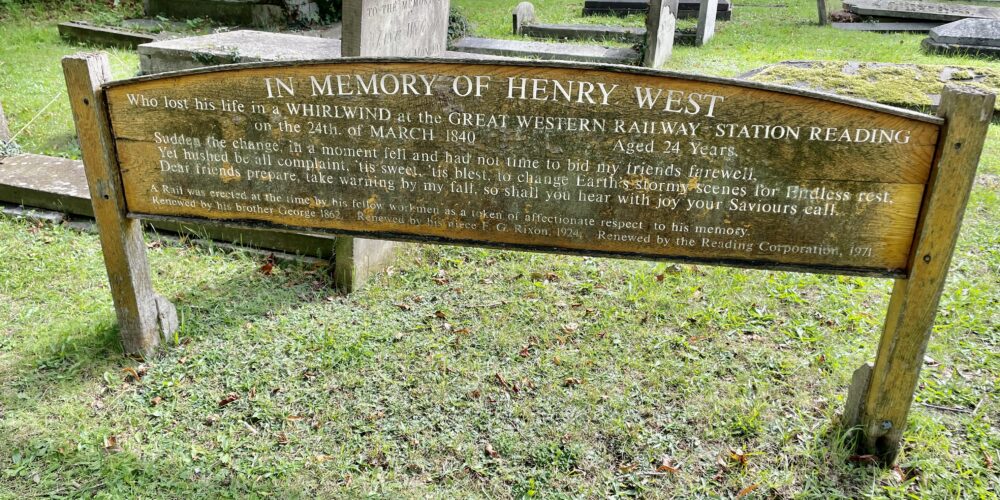Why we must honour the ordinary humans in our lives

I was once walking through the older parts of Reading, a town in the United Kingdom. I came upon a lovely old church hidden behind the town centre, and in it a cemetery. There I found this gem: a large wooden grave marker, with an inscription in memory of Henry West.
Who was Henry West? A local grandee? An important leader? A wealthy parishioner? Not at all. Henry was an ordinary railway worker who lost his life in a whirlwind at Great Western Railway Station in 1840, aged just 24. The sign explained that a rail at the new station was erected at the time by his fellow workmen as a token of affectionate respect to his memory. The graveyard monument I was viewing was renewed by his brother a few years later, and then by his niece in the following century. Finally, the Reading Corporation (the predecessor to the local council) took charge of the memorial in 1971.
A beautiful poem is also found inscribed therein:
“Sudden the change, in a moment fell and had not time to bid my friends farewell,
Yet hushed be all complaint, tis sweet, ’tis blest, to change Earth’s stormy scenes for Endless rest,
Dear friends prepare, take warning by my fall, so shall you hear with joy your Saviour’s call.”
I was deeply moved. First, by the initial gesture by the young man’s workmates; then by his relatives and ultimately the local authorities; and lastly by those wise words. When does it happen that an ordinary person is grieved by anyone other than immediate relatives? And how rare is it for leaders to commemorate a commoner who dies?
Certainly those who run the world seem to do and believe the exact opposite: that ordinary people are no better than irrelevant dots. I saw this put on screen in that remarkable film, The Third Man—surely one of the best ever made. In it, there is the famous scene where Orson Welles’ amoral racketeer is perched atop a Ferris wheel with his more high-minded friend. Our unscrupulous villain has been preying on the innocent by diverting vital penicillin after the second World War. When his friend asks whether he feels nothing for his victims, this is his chilling reply as he points to the multitudes below their vantage point:
“Victims? Don’t be melodramatic. Look down there. Would you really feel any pity if one of those dots stop moving — forever? If I offered you twenty thousand for every dot that stops, would you really, old man, tell me to keep my money or would you calculate how many dots you could afford to spare? Free of income tax, old man. Free of income tax. The only way you can save money nowadays.”
He goes on to say:
“You’re just a little mixed up about things in general. Nobody thinks in terms of human beings. Governments don’t, why should we? They talk about the people and the proletariat, and I talk about the suckers and the mugs. It’s the same thing. They have their five-year plans and so have I.”
And that, I’m afraid, summarizes the world we humans have constructed. It is manipulated daily by those who see no humans, they see only dots on a screen—data points, ballots, wallets, incomes—to be deceived and deprived. Those who lead governments see only voters to be tricked into believing, and then to be lined up for fleecing. Those who lead corporations are only rarely any different. Their employees are just resources, a force to deliver profit to the bosses; their customers are just suckers and mugs.
In this philosophy success comes from being one of the deceivers, rather than the deceived. Across the world, the ordinary folk are easily manipulated, easily denuded—and easily killed.
That is why I was so moved to see the people of a faraway town in a faraway time having the decency to commemorate the death of one of the “dots.” There may be billions and billions of lives on this planet at any given moment, but every one of them matters. We reduce ourselves to mere savages when we regard them all as expendable for our selfish aims. Educated, sophisticated, well-dressed savages—but savages nonetheless.
As another year ends, I urge everyone to view everyone else with respect, compassion, understanding, and kindness. Too many of our role models are taking us in the opposite direction—to think nothing of the teeming masses, to look away from their struggles, and to view them as votes or dollars. These brigands in fancy suits will be the end of humanity someday, for they will have no reluctance to reduce everyone else to poverty, or to smithereens, in pursuit of their greedy and self-serving quests.
We cannot let this happen. The first way to prevent it is to prevent it in our own lives. We must regard every act of labour around us as honourable, every sentiment as valid, every struggle as troubling—and every life as meaningful. If we lose that, we lose our moral core and become heartless barbarians.
(Sunday Nation, 24 December 2023)

Buy Sunny Bindra's new book
The X in CX
here »
Popular Posts
- The pause that saves usJune 8, 2025
- The first push is the hardestJune 1, 2025
- Where are you rushing to—your funeral?June 29, 2025
- How to spot a real thinkerJune 15, 2025
- Built the app, forgot the flowJune 22, 2025















